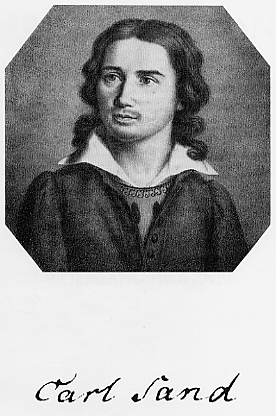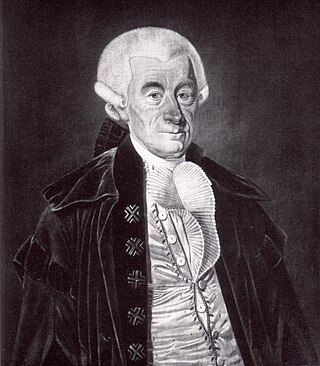
Johann Adam Hiller was a German composer, conductor and writer on music, regarded as the creator of the Singspiel, an early form of German opera. In many of these operas he collaborated with the poet Christian Felix Weiße.

Karl Philipp Moritz was a German author, editor and essayist of the Sturm und Drang, late Enlightenment, and classicist periods, influencing early German Romanticism as well. He led a life as a hatter's apprentice, teacher, journalist, literary critic, professor of art and linguistics, and member of both of Berlin's academies.

Johannes Nikolaus Tetens was a German-Danish philosopher, statistician and scientist.

Karl Ludwig Sand was a German university student and member of a liberal Burschenschaft. He was executed in 1820 for the murder of the conservative dramatist August von Kotzebue the previous year in Mannheim. As a result of his execution, Sand became a martyr in the eyes of many German nationalists seeking the creation of a united German national state.

Friedrich Hermann Loew was a German entomologist who specialised in the study of Diptera, an order of insects including flies, mosquitoes, gnats and midges. He described many world species and was the first specialist to work on the Diptera of the United States.

Eduard von Martens also known as Carl or Karl Eduard von Martens, was a German zoologist.

Heinrich Suter was a historian of science specializing in Islamic mathematics and astronomy.

Mathias Caspar Hubert Isenkrahe was a German mathematician, physicist and Catholic philosopher of nature.
Johannes Adolf von Kries was a German physiological psychologist who formulated the modern “duplicity” or “duplexity” theory of vision mediated by rod cells at low light levels and three types of cone cells at higher light levels. He made important contributions in the field of haemodynamics. In addition, von Kries was a significant theorist of the foundations of probability.

Johann August Starck also Stark was a prolific author and controversial Königsberg theologian, as well as a widely read political writer now best remembered for arguing that an Illuminati-led conspiracy brought about the French revolution. Immanuel Kant and Johann Georg Hamann were among his acquaintances in Königsberg. His broadly deistic approach emphasized natural religion and smoothed over doctrinal differences among the various faiths.

Lorenz von Westenrieder was a well-known author and historian in Bavaria and a critic of the Elector Karl Theordor and supporter of Maximilian IV Joseph. There are several memorials to him in Munich.

Johann Stephan Pütter was a German law lecturer and publicist. He was professor of law at the university of Göttingen from 1746 until his death. He exerted great influence on the law institutions of his time. His principal work is Historische Entwicklung der heutigen Staatsverfassung des Deutschen Reichs.
Franz Anton Knittel was a German, Lutheran orthodox theologian, priest, and palaeographer. He examined palimpsests' text of the Codex Guelferbytanus 64 Weissenburgensis and deciphered text of Codex Carolinus. He was the author of many works.

Johann Melchior Goeze was a Lutheran pastor and theologian during the period of Late Orthodoxy. From 1760 to 1770 he served as senior of Hamburg presiding as spiritual leader over the Lutheran state church of the city-state.
Friedrich August Carus was a German philosopher. He was the father of surgeon Ernst August Carus (1797–1854).
Friedrich Traugott Wettengel was a Bohemian Lutheran theologian.
Georg Mancelius was a Baltic German Lutheran theologian in what is now Latvia. He wrote the first dictionary of the Latvian language. From 1635 to 1636 he was Vice Rector of the University of Tartu and from 1636 Rector.
Julius Döring was a Baltic German painter, drawing teacher, historian, archaeologist, librarian and museum worker.
Peter Buchholz was a German rabbi who served from 1875 to 1892 as Landesrabbiner of Friesland.
Solomon Pucher was an Imperial Russian religious leader, who served as rabbi of Mitau and Riga.











